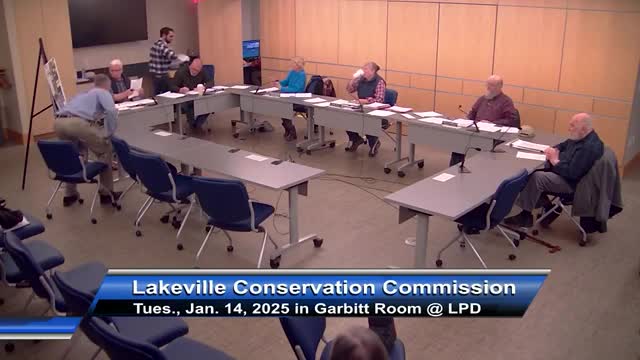Commission closes hearing on Route 18/79 drainage and sidewalk project pending Army Corps and Taunton conditions
Get AI-powered insights, summaries, and transcripts
Subscribe
Summary
Lakeville Conservation Commission voted Jan. 14 to close the hearing on proposed Route 18/79 sidewalk and drainage work and to issue an order of conditions, conditioned on receipt of Army Corps and Taunton Conservation Commission approvals and MassDOT comments.
The Lakeville Conservation Commission heard detailed revisions Jan. 14 to a Route 18/79 frontage improvement project (presented by Beta Group) that includes sidewalk construction, curb extensions and upgrades to catch basins, culverts and off‑road stormwater controls. After discussion, the commission voted to close the hearing and authorize an order of conditions subject to receiving Taunton Conservation Commission and Army Corps of Engineers documentation and comments, allowing a 45‑day drafting/coordination window before finalizing conditions.
John Miro, professional wetland scientist with Beta Group, and project manager Matt Shute described plan revisions made during federal and state review. They reported adjustments to reported land‑under‑water impacts to account for temporary dewatering of culverts and said they submitted a revised Notice of Intent, stormwater narrative, and construction plans to the commission and to MassDOT. Beta Group described measures to address an increase in impervious surface and to add water‑quality features such as deep‑sump catch basins and swales.
Miro and Shute said Army Corps coordination produced mostly administrative comments and that federal interagency review (including USFWS and FEMA) was underway. MassDOT had performed nearby roadway changes in 2023 that altered local drainage patterns; commissioners asked for a copy of MassDOT comments and of Army Corps responses. Beta Group said final authorization from the Army Corps was anticipated in the near term; construction was projected to begin in spring 2026.
Commissioners agreed to require that, before construction begins, the applicant provide: (1) Army Corps authorization letter and any associated conditions; (2) Taunton Conservation Commission order of conditions (if applicable); and (3) MassDOT comments and responses. The commission added the requirement that final documents be incorporated into Lakeville’s order of conditions. A motion to close the hearing and issue an order with a 45‑day period to incorporate those materials carried on a recorded vote.
The commission also discussed dewatering and culvert‑work methods, including staged bypass piping or temporary pumping, the handling of temporary land‑under‑water impacts, and the need to schedule any in‑stream work for low‑flow periods and to maintain downstream flow.
